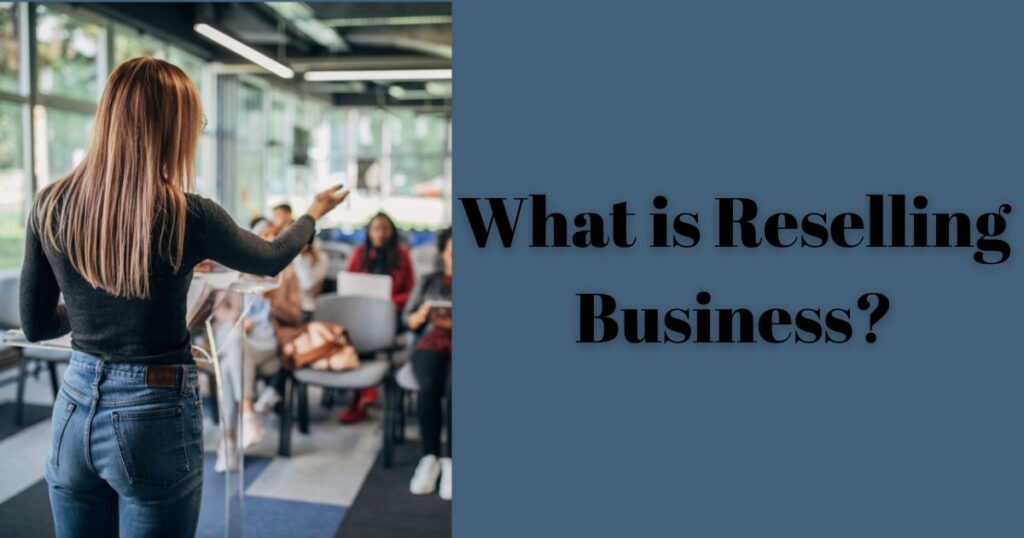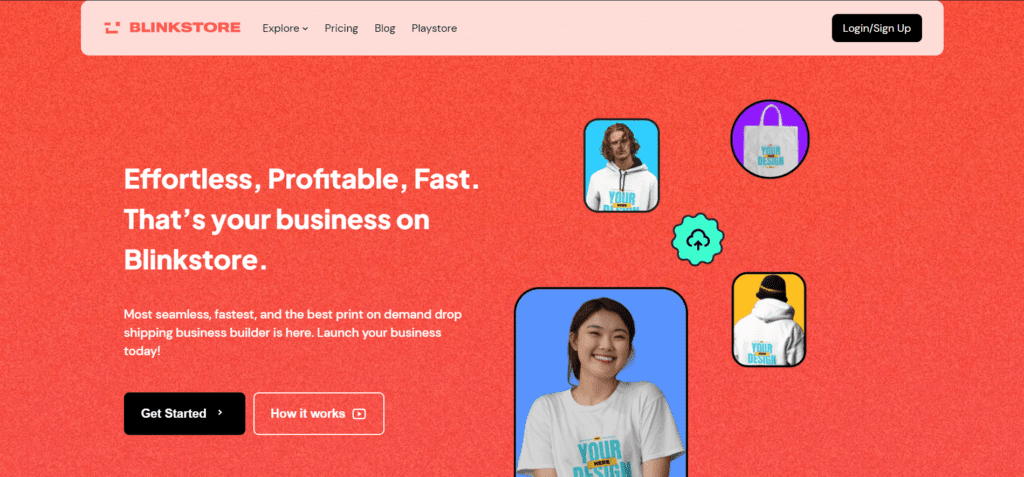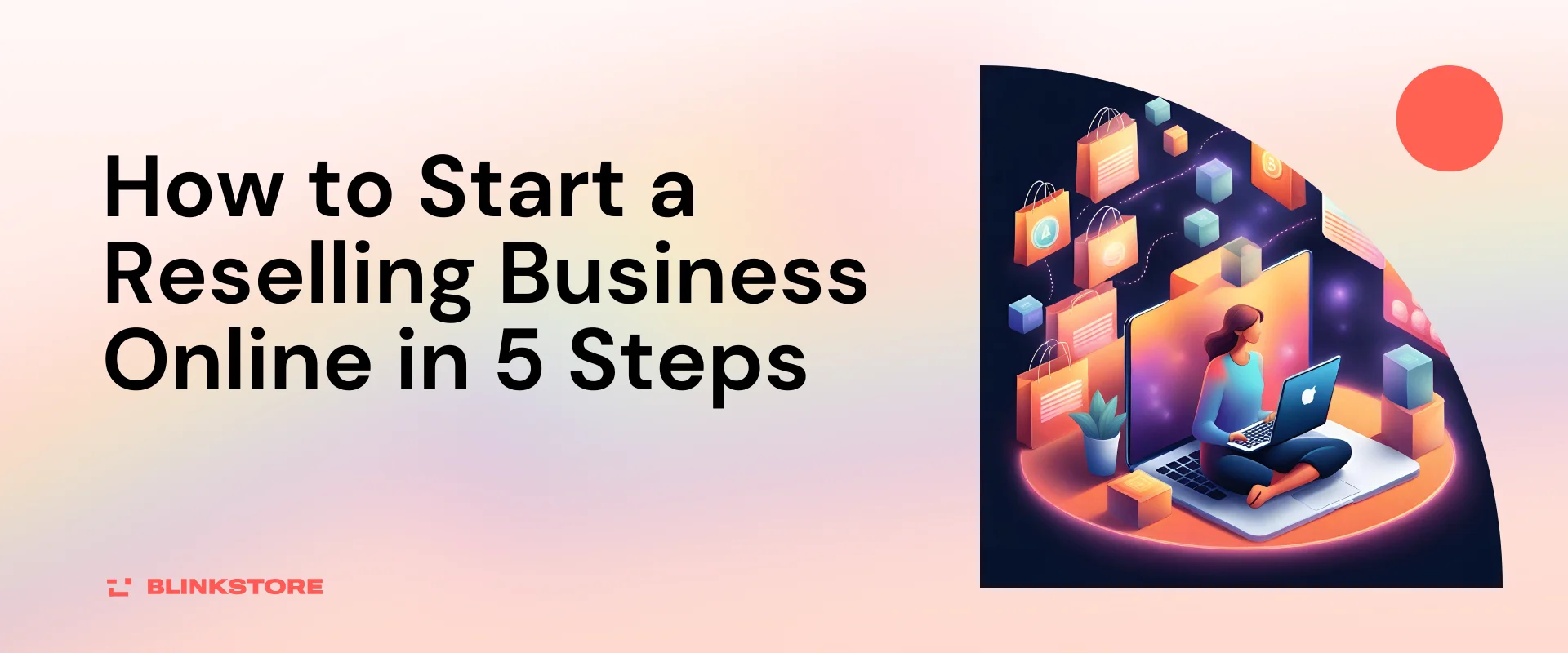With the rise of e-commerce, the opportunities in the reselling business have multiplied, creating a fertile ground for budding entrepreneurs. Online reselling is a lucrative opportunity for both new and experienced business owners, especially if you don’t want to conduct your own product research and development. You can resell wholesale products, as well as used and specialty items, through your own online storefront and third-party platforms.
Table of Contents
The words of Gary Vaynerchuk, entrepreneur and social media personality: “Reselling is a real business. It’s not a garage sale hustle. It’s about understanding supply and demand, building relationships, and creating value.”
Ready to turn your passion into profit effortlessly? Blinkstore, your all-in-one platform, is here to transform your reselling dreams into reality.
What is Reselling Business?

The concept is simple – buying products at a reasonable price and reselling them for a profit. Here, You become a bridge, connecting seekers of quality products with the products they desire.
Reselling involves
- Sourcing Products: Identify products with potential market demand.
- Buying Smart: Acquire products at favorable prices to ensure a healthy profit margin.
- Showcasing Creativity: Present your curated selection attractively and uniquely.
- Customer Connection: Build a community around your brand through stellar customer service.
Why Reselling? Why Now? (Benefits)
Let us get to some benefits now.
- Low Entry Barriers: Unlike traditional businesses, you don’t need a hefty upfront investment.
- Flexibility: Set your own schedule and work from anywhere.
- Minimal Risk: Test the waters without drowning in financial commitments.
- Creativity: Showcase your unique taste and style.
- Scalability: Grow at your own pace, from a side hustle to a full-fledged business.
- Environmental impact: Studies suggest that buying secondhand clothing can save up to 80% of the water and energy used in producing new clothes.
How to Start a Reselling Business in 5 Steps

You can learn how to start a reselling business with these steps. Remember to note down the tools.
#1. Choosing the Right Products to Resell
Pinpoint your interests and expertise. Whether it’s fashion, gadgets, or vintage treasures, choosing a niche you love ensures sustained enthusiasm.
Pro Tip: Consider micro-niches within broader categories for less competition and a more targeted audience.
a. Market Research, Research
Dive deep into online trends and consumer behavior. Tools like Google Trends and social media analytics can unveil what’s hot and what’s not.
b. Profit Potential
While passion is crucial, balance it with profit potential. Assess the market value of your chosen niche and ensure there’s room for a healthy margin.
Stat: Did you know that 75% of successful resellers attribute their success to balancing passion with profit? Now you do!
c. Test the Waters
Before committing to a large inventory, test a variety of products. Small-scale trials help gauge customer interest without major financial risks. You can also use customer feedback during these trials to fine-tune your product offerings.
#2. Building Trustworthy Partnerships
Now that you’ve defined your product niche, the next step is securing reliable suppliers and wholesalers. Your success hinges on the quality and consistency of your supply chain.
a. Research Again
Scout potential suppliers diligently. Look for reviews, ratings, and testimonials. A trustworthy supplier is the backbone of your reselling venture.
Recommendation: Utilize supplier directories like Alibaba or Ali Express for a comprehensive supplier search.
b. Communication is Key
Establish clear communication channels. Discuss terms, lead times, and any potential customization options. A transparent relationship is built on open dialogue.
c. Quality Check:
Request samples before committing to bulk orders. Ensure the quality aligns with your brand standards. Happy customers start with quality products.
d. Negotiate Wisely
Don’t hesitate to negotiate terms that benefit both parties. Build a partnership that’s mutually rewarding and fosters long-term collaboration.
#3. Setting Up Your Online Store for Reselling Business
a. Choose the Right Platform

Set up your online store by exploring the diverse options provided by platforms like Blinkstore, Shopify, WooCommerce, and Etsy, each offering unique features tailored to different business sizes and needs.
Success story: Words of Seed Sawant creator Of DeadAssCheeze.
“I chose Blinkstore because I tried different sites and couldn’t find any other provider that offered all the Options I needed under one platform, the team helps and understands each and every creator. I am proud to be one of the very first stores on Blinkstore. Hope to grow more and keep the quality the same!”
b. Design Matters
Opt for a user-friendly interface with a clean and intuitive design that ensures seamless navigation for your customers. Leverage tools like Canva or Adobe Spark to design eye-catching banners and promotional materials that enhance the visual appeal of your storefront.
c. Optimize Product Listings
Craft compelling product descriptions that go beyond the basics, highlighting features and benefits. Integrate relevant keywords strategically to optimize your product listings for improved visibility on search engines.
d. Secure Payment Gateways
Offer a plethora of secure payment options to cater to diverse customer preferences. Consider integrating digital wallets such as PayPal or Stripe for a seamless and secure transaction experience.
Pro Tip: A variety of payment options can significantly enhance the overall customer shopping experience.
#4. Marketing and Promoting Your Reselling Business
With your online store in place, it’s time to focus on social media presence, leveraging influencer partnerships, content creation, and email marketing.
a. Social Media
Strategically choose platforms aligned with your target audience. Instagram might reign supreme for visual products, while LinkedIn could be ideal for professional offerings. Run targeted ad campaigns to reach potential customers and create a strategic online presence.
b. Leverage Influencer Partnerships
Collaborate with influencers aligned with your niche for authentic endorsements. Utilize platforms like Influencity or Traackr to identify potential influencers who can amplify your brand reach.
c. Content is King
Integrate a blog into your online store to create engaging content related to your niche. Share valuable tips, personal stories, and in-depth product features. Regularly updating your blog enhances your search engine rankings, driving more organic traffic to your site.
d. Email Marketing
Build a subscriber base by encouraging visitors to subscribe for exclusive offers and updates. Utilize email marketing platforms like Mailchimp or Klaviyo to execute targeted email campaigns that resonate with your audience.
#5. Managing Inventory and Order Fulfillment
Invest in automation tools like TradeGecko or Zoho Inventory for real-time tracking and automated restocking. Implement a just-in-time inventory system to minimize storage costs and optimize operational efficiency.
a. Shipping Strategies
Provide customers with various shipping options, including expedited and standard choices. Clearly communicate shipping times to manage customer expectations and enhance overall satisfaction.
b. Customer Service Excellence
Respond promptly to customer inquiries and feedback, as exceptional customer service is the cornerstone of a successful reselling business. Utilize customer service platforms like Zendesk or Freshdesk to streamline communication and foster positive relationships with your customers.
How to Start a Reselling Business in India
You may be wondering how to start a reselling business in India. The answer is nothing out of the ordinary; simply follow the steps outlined above and make sure you are familiar with the rules and laws governing online businesses in your area. Consider making cash-on-delivery available to customers to make things easier for them.

3 Reseller Business Ideas in 2024
Curated Sustainable Home Decor Reseller
Handpick vintage and eco-friendly home decor items for a unique touch. Hot because people crave distinctive decor, care about sustainability, and want personalized homes.
- Platforms: Instagram, home decor marketplaces, and local craft fairs.
- Key factors: Good taste, curation, knowledge of sustainable materials, and a knack for creative photography, and storytelling.
Niche Gaming Apparel Reseller
You can specialize in vintage or limited-edition gaming apparel, centering on specific game franchises or esports teams. This niche is in demand because of the thriving gaming community, collector enthusiasm, and a rising desire for authentic merchandise.
- Platforms: Twitch live streams, dedicated gaming forums, and social media groups.
- Critical factors: In-depth understanding of gaming trends, active community engagement, adept sourcing of rare items, and establishing trust and authenticity.
Clothes Reselling
Focus on reselling high-quality, pre-owned clothing items. Clothing business works because of the growing interest in sustainable fashion, affordability, and the thrill of unique finds.
- Ideal Platforms: Online marketplaces, social media platforms, and local community events.
- Key Aspects: Effective marketing, curation skills, understanding fashion trends, and building a loyal customer base.
Tips for Success in the Reselling Business
- Adaptability is Key: Stay abreast of market trends and be ready to pivot your strategy when necessary.
- Customer Feedback: Embrace feedback as a tool for growth. Analyze reviews to enhance both products and services.
- Stay Updated: The e-commerce landscape evolves; stay informed and continuously upskill to stay competitive.
Challenges and Potential Risks in Reselling Business
Challenges
- Supplier Reliability: Always have alternative suppliers in mind to mitigate risks associated with supplier unreliability. Cultivate relationships with multiple suppliers for a robust and resilient supply chain.
- Market Saturation: The market for certain products or services may be oversaturated, making it challenging to stand out and attract customers.
- Competition: Intense competition from other resellers or retailers can lead to price wars and reduced profit margins.
Potential Risks
- Fluctuating Market Trends: Stay vigilant and regularly assess market trends to adjust your inventory accordingly. Utilize trend forecasting tools like WGSN for early trend identification.
- Legal Issues: Resellers need to be aware of and comply with laws and regulations related to product safety, labeling, and intellectual property. Unauthorized resale of certain products may lead to legal consequences.
- Counterfeiting: The risk of unknowingly selling counterfeit goods is a significant concern in the reselling business. This can damage your reputation and lead to legal action.
Resources and Tools for Online Reselling Business
Resources and tools are essential for running a successful reselling business.
E-commerce Platforms
- Blinkstore: All-in-one platform where you can start and maintain your online store for free along with other benefits.
- Shopify: A user-friendly platform for creating and managing your online store.
Market Research Tools
- Google Trends: Unveil trending topics and insights in real time.
- Social Media Analytics: Utilize platforms like Facebook Insights for audience behavior analysis.
Inventory Management Systems
- Zoho Inventory: Streamline your inventory processes with this comprehensive tool.
- Spreadsheets: A simple, straightforward option for organizing basic inventory details like item type, price, purchase cost, and listing location.
Shipping Solutions
- Shippo: A platform that simplifies shipping processes, from label creation to tracking.
- ShipStation: Effortlessly manage orders and shipping from multiple sales channels
Conclusion
As you step into the reselling arena, keep refining your strategy, stay connected with your audience, and embrace the challenges as opportunities for improvement. Your success story in the reselling world is waiting to unfold, and the tools and tips shared here will help you succeed in starting your reselling business.
FAQs – How to Start a Reselling Business Online
Here are some frequently asked questions about How to Start a Reselling Business Online.
How profitable is reselling?
Profitability in reselling varies based on factors such as product selection, market demand, competition, and effective business strategies. With careful planning and execution, reselling can be a profitable venture.
How to become a reseller?
Research and Select Niche: Identify the products you want to resell.
Legal Requirements: Register your business, obtain necessary licenses, and comply with tax regulations.
Find Suppliers: Establish relationships with reliable suppliers or wholesalers.
Create a Business Plan: Outline your goals, target market, and marketing strategy.
Build an Online Presence: Set up a website or use online marketplaces to showcase your products.
Market Your Business: Develop a marketing strategy to reach your target audience.
Manage Inventory: Implement an inventory management system.
Is reselling legal in India?
Yes, reselling is legal in India. However, it’s important to comply with local regulations, obtain necessary licenses, and adhere to tax laws to operate your reselling business legally.
Can I buy and resell items?
Yes, buying and reselling items is a common business model. It involves purchasing products from suppliers or manufacturers and selling them to customers for a profit.
Is reselling profitable in India?
Reselling can be profitable in India, but success depends on various factors such as market demand, product selection, pricing strategy, and effective marketing. Thorough research and strategic planning are essential for profitability.
What is the best reselling product?
The best reselling product depends on market trends, consumer demand, and your expertise. Conduct market research to identify products with a consistent demand and consider factors like seasonality and competition. Popular reselling categories include fashion, electronics, and home goods.
